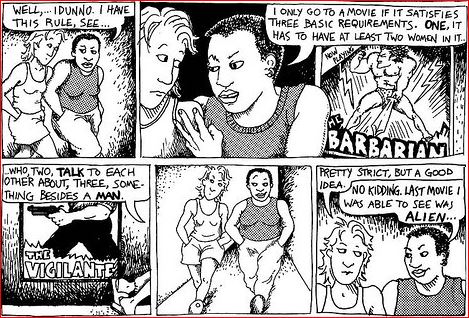I had meant to make this the Weekend Open Thread for the weekend of the Academy Awards, but better a little late than waiting almost another entire year and probably forgetting again. This is about a famous test that some readers may know well but my guess is that others have never heard about: the Bechdel Test.
Unfortunately, because of where the alt-cartoonist Alison Bechdel broke the panels, including the “test” without chopping up and reassembling the original strip (which I think was from 1990 or so) means including half of the original; you’ll find the other half at the link.
At that link, you’ll also find some interesting discussion. Is a movie only worth watching if it contains at least two women who talk to each other about something besides a man? Don’t get hung up on that question of political aesthetics; it’s not the real point. The real point is “consciousness raising” — leading readers to think about how many movies do not pass the Bechdel Test because they either (1) have fewer than two female speaking characters or (2) those characters never talk to each other or (3) those characters talk to each other only about a man.
My sense is that more popular movies pass the Bechdel Test today than did so in 1990 — in fact, applying the Bechdel Test over time is a pretty fair “ballpark estimate” way of assessing change in our popular culture — but it’s still amazing how many don’t.
Should this be surprising? Well, try applying the Reverse Bechdel Test to movies: how many movies have at least two men talking to each other about something other than a woman? (It might be much easier to identify those that involve adults at all that don’t!) And, of course, both the Bechdel Test and the Reverse Bechdel Test don’t have to be binary; one could count up the number of “Bechdel-Passing” scenes in a movie and the number of “Reverse Bechdel-Passing” scenes in a movie and tote them up.
Many people like to say that our society is now equal in terms of race, gender, etc. Well, here’s an easy way to check. If, as I suspect, the number of movies that pass the Bechdel Test is far, far, far smaller than the number passing the Reverse Bechdel Test — and if, as I further suspect, it becomes worse when you actually tote up the numbers in each scene — than that suggests that there’s some amount of residual inequality in our culture. That “residual” amount is probably huge — go ahead and explain it away.
My daughters love watching movies. Inevitably, this is part of acculturating them. What are they — and your own daughters and granddaughters (and nieces, etc.) — learning from watching movies that don’t pass the Bechdel test? Here’s a final thought: nothing prevented anyone from making one of the thirteen dwarves in “The Hobbit” female; greater liberties were taken elsewhere in the Tolkein adaptations. But if only one were female, what would that do to the interactions we’d expect in the script? What if it were two? What if it were three — or six, or seven of the thirteen?
This your Weekend Open Thread. Discuss this, or anything else you’d like, within reasonable bounds of decorum. And this is also the place where you can drop interesting tidbits that don’t fit in elsewhere over the course of the week. Happy St. Patrick’s Day!








Santa Ana council will have their say so monday night on the MJ intiative. It show be a good show.
What do you think they will do about the marijuana initiative on the agenda tomorrow night?
The report they ordered in the prior council meeting is pretty damming for the proponents.
(The report is 112 pages and the last item on the downloadable agenda)
Give us a link, sir!
http://www.ci.santa-ana.ca.us
go to city hall then clerk of council.
bottom of page, current agenda plus staff reports.
Mercury went direct today at 1:02 pm PDT. It has been retrograde since February 23rd.
This means that all aspects of communication will improve….computers won’t crash as often for no apparent reason, and your cell phone will work better. Information that you have been waiting for will now start flowing, and you are more likely to be on the same page as your spouse, family members, and friends.
It’s time to get ready for new beginnings, and prepare yourself for action!